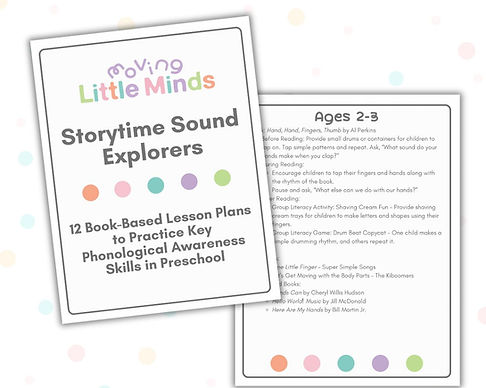The Power of Repetition in Learning!
- Melissa McCall
- Nov 14, 2023
- 4 min read
Updated: Jun 5
You are preparing for a little quiet time in the classroom or at home and it is time to snuggle up and read. A child brings over Little Blue Truck for you to read for the 95th time! In your mind, you’re thinking, "Not again!".

However, you put on your biggest smile, snuggle in close, and embark on the wonderful adventure of Little Blue Truck once again. While reading the same story again and again may seem mentally exhausting for us as parents and teachers, repetition in learning is a brain boosting activity for our children!
Brain Development
As the brain grows and develops in the early years of life, there is a rapid explosion of neurons. Neurons are like tiny messengers in our body that carry important information to make our body work properly. They help send messages from one part of our body to another so we can move, think, and feel.

When children engage in meaningful, repeated experiences, the brain forms strong connections between neurons. That connection becomes part of the brain's architecture. However, if children are exposed to an activity once or twice and the experience is never repeated again, the brain naturally recognizes the connection as weak and eliminates the extra connection between neurons. The is called pruning. This pruning helps our brain work more efficiently and focus on the important connections we need for thinking and learning.
Repetition in Learning and the Science of Reading
When we think of repeated experiences in relation to learning to read, the science is the same! The science of reading has proven that 95% of ALL children can learn to read through systematic, explicit, research-based instruction. The science of reading has proven that explicit connections have to be made in different regions of the brain. These connections can be strengthened through repetition! Repeated and explicit instruction that systematically and clearly teaching specific reading skills will lead to reading success.

https://www.lexialearning.com/blog/what-is-the-science-of-reading-how-the-human-brain-learns-to-read
The main components of reading that must be intertwined are displayed above in Scarborough's Reading Rope. These skills include are phonics, decoding, fluency, vocabulary, and comprehension strategies. Research has proven that children can successfully learn to read by systematically learning skills that build upon one another, making explicit connections between different regions of the brain. Practicing those skills consistently leads to reading success!
Let's Foster Repetition in Learning!
Now that we understand the power of repetition for brain development and reading, let's dive into how we can build an environment in the classroom and at home that fosters repetition and brain building success! Below are a list of important activities to foster growth.
Consistent Routines: Establishing routines involves creating a structured daily schedule for children. Predictable routines help children understand what to expect, reducing anxiety and promoting a sense of security. Routines provide a framework for daily activities like meal times, play, learning, and rest. Routines also foster independence by allowing children to anticipate transitions and take an active role in their daily activities.
Repetitive Play: Repetitive play involves engaging children in activities they can do repeatedly, allowing them to explore and reinforce various skills. Building with blocks, sorting shapes, or engaging in pretend play scenarios repeatedly strengthens cognitive abilities like problem-solving, creativity, and memory. Such activities also enhance fine motor skills and hand-eye coordination.
Repeated Readings and Song: Regular reading sessions and songs involving the same story or poem exposes children to different language patterns, tones, and vocabulary. Repeated experiences with literature allows for deeper questioning, aids in language development, and provides opportunities to build phonological awareness skills.
Skill-Building Activities and Review: Introducing activities targeting specific skills, such as alphabetic knowledge, puzzles, phonological awareness, counting, and building, provides children with opportunities to practice and refine those skills over time.

Consider how you can build upon prior knowledge and include a spiral review of skills. Think about how phonological awareness skills build upon one another and review and build on to these skills. Consider teaching the alphabet in cycles to consistently review and reteach! I love to use the Moving Little Minds Alphabet Motions Flashcards to incorporate movement into learning!

Consistent Vocabulary Use: Using consistent language when explaining concepts or instructions ensures repeated exposure to specific words and phrases. This repetition aids children in understanding, retaining, and eventually using new vocabulary in their own communication.
Broad Thematic Learning: Exploring a particular theme or topic over an extended period helps children make deep connections to themselves and the world around them. Focusing learning around a broad theme, such as change, rather than switching themes weekly, reinforces learning by providing a deeper understanding of the topic across different contexts.
Review and Reinforcement: Periodically reviewing previously learned concepts through modeling and hands-on activities reinforces understanding and retention. It helps solidify knowledge and allows children to apply what they've learned in different contexts.
Consistent Feedback: Offering positive and constructive feedback regularly acknowledges effort and improvement. It reinforces a growth mindset, encouraging children to persevere in their learning journey!
By incorporating these strategies, you can create an environment that maximizes the benefits of repeated experiences, fostering holistic learning and development in young children! Repeated experiences play a crucial role in the development of young children. Let's intentionally create experiences and environments that foster and embrace repetition!
Did you find this post helpful? Leave a comment and share this post!
Looking for Literacy-Based Products and Books?
Check out my Amazon Idea Lists!

Need Support? Reach Out!

Moving Little Minds is dedicated to helping schools and parents improve literacy instruction for young children using engaging, research-based practices, trainings, preschool classes, and materials.




















%20(52).jpg)

Comments